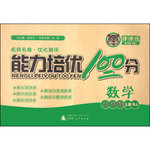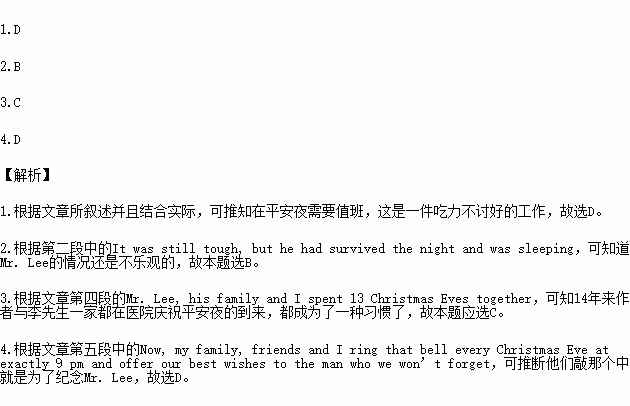题目内容
阅读下列短文,从每题所给的A、B、C、D四个选项中,选出最佳选项,并在答题卡上将该项涂黑。
A Special Appointment
Years ago I moved to Woodland Hills to take a job in a small hospital’s emergency department.No one wanted to work on Christmas Eve, so the shift (轮班) went to me.I kissed my family goodbye and went off to spend the night in the hospital.It was a thankless job.
At 9 pm, the ambulance brought in a man in his 60s who was having a heart attack.His face was pale, and he was frightened. The whole night I did my best to save his life.Before I left in the morning to spend Christmas with my family, I stopped by to see how he was doing.It was still tough, but he had survived the night and was sleeping.
The following year I got Christmas Eve duty again.At 9 pm sharp, the ward clerk told me there was a couple who wanted to speak with me.When I approached them, the man introduced himself as Mr.Lee and said, “You probably don’t remember me, but last Christmas Eve you saved my life.Thank you for the year you gave me.” He and his wife hugged me, handed me a small gift, and left.
The following year a new doctor had joined the group, but I wanted to see if Mr.and Mrs.Lee would return.This time, I volunteered for the shift.I kept an eye on the door.Once again, at exactly 9 pm, the Lees appeared, carrying a warmly wrapped bundle.It was their new grandchild. Mr.Lee, his family and I spent 13 Christmas Eves together.In the later years the staff all knew about the story and would work to give me time with him in the break room, where we spent a half-hour each Christmas Eve.
The last year I saw him, he brought me a gift.I carefully opened the package and found a crystal (水晶) bell inside.It was engraved (镌刻) with a single word: Friendship.Now, my family, friends and I ring that bell every Christmas Eve at exactly 9 pm and offer our best wishes to the man who we won’t forget.
1.Working on Christmas Eve was considered “a thankless job” because ______.
A. most patients were seriously ill
B. patients refused to express thanks
C. doctors had nothing to do on that day
D. doctors couldn’t get praise for the hard job
2.When the author left the hospital the next morning, Mr.Lee ______.
A. was really angry with her
B. was still in a state of danger
C. got ready to leave the hospital
D. recovered from his heart attack
3.According to the passage, the author formed a habit of ______.
A. celebrating Christmas Eve with her family
B. giving Christmas gifts to the hospital staff
C. spending Christmas Eve with Mr.Lee in hospital
D. ringing the bell for patients in the emergency department
4.Why does the author ring the bell on Christmas Eve?
A. To honor her working experience.
B. To tell kids the traditional custom.
C. To show the beginning of the holiday.
D. To remember an old friend of hers.
 课课优能力培优100分系列答案
课课优能力培优100分系列答案 优百分课时互动系列答案
优百分课时互动系列答案
